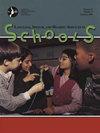自闭症儿童阅读能力与新兴读写能力的相关性:一项元分析。
IF 2.9
3区 医学
Q1 AUDIOLOGY & SPEECH-LANGUAGE PATHOLOGY
Language Speech and Hearing Services in Schools
Pub Date : 2025-06-20
DOI:10.1044/2025_lshss-24-00108
引用次数: 0
摘要
目的:与非自闭症的同龄人相比,自闭症个体通常表现出较差的新兴识字技能(例如,语音意识、印刷知识、口语)。虽然在典型的发展中,新兴的读写能力会影响未来的阅读成功,但它们与自闭症儿童的单词识别和阅读理解的关系尚不清楚。本荟萃分析的目的是确定年轻自闭症儿童的新兴识字技能与阅读能力(即单词识别和阅读理解)之间的相关性。方法14项相关研究纳入837例28 ~ 109月龄自闭症儿童,符合纳入标准。使用稳健方差估计来计算平均加权效应大小,并探讨了可能的调节变量。结果:学生的读写能力与阅读能力之间存在显著的正相关关系。调节分析表明,在阅读能力类型(即单词识别vs.阅读理解)或突发性读写能力(即基于代码的技能vs.基于意义的技能)的基础上,突发性读写能力与阅读能力之间的相关性没有差异。然而,智商是一个边际显著的调节因子,并且在平均智商得分较低的研究中,新兴读写能力和阅读能力之间的关系更强。结论本研究结果对幼儿孤独症的研究和实践具有重要的指导意义。教育工作者和其他从业者需要(a)评估儿童早期的突发读写能力,以更好地识别有阅读困难风险的自闭症儿童;(b)积极促进和教授自闭症儿童的突发读写能力,因为这些技能与更高级的阅读能力有关。补充MATERIALhttps: / / doi.org/10.23641/asha.29231057。本文章由计算机程序翻译,如有差异,请以英文原文为准。
Correlation Between Emergent Literacy Skills and Reading Abilities in Young Autistic Children: A Meta-Analysis.
PURPOSE
Autistic individuals often exhibit poorer emergent literacy skills (e.g., phonological awareness, print knowledge, oral language) relative to their non-autistic peers. Although emergent literacy skills are known to impact future reading success in typical development, their relationship with word recognition and reading comprehension in autistic children remains unclear. The purpose of this meta-analysis was to identify the correlation between emergent literacy skills and reading abilities (i.e., word recognition and reading comprehension) in young autistic children.
METHOD
Fourteen correlational studies, including 837 autistic children ranging in age from 28 to 109 months, met the inclusion criteria. Robust variance estimation was used to compute an average weighted effect size, and possible moderator variables were also explored.
RESULTS
Results indicated a significant, positive correlation between emergent literacy skills and reading abilities. Moderator analyses indicated that the correlations between emergent literacy and reading ability did not differ based on the type of reading ability (i.e., word recognition vs. reading comprehension) or emergent literacy skill (i.e., code- vs. meaning-based skills). However, IQ was a marginally significant moderator, and the relation between emergent literacy and reading ability was stronger in studies with participants with lower average IQ scores.
CONCLUSIONS
These findings have important implications for research and practice for young autistic children. There is a need for educators and other practitioners to (a) assess emergent literacy skills in early childhood to better identify autistic children who are at risk for reading difficulties and (b) actively promote and teach emergent literacy skills in young autistic children, as these skills are related to more advanced reading abilities.
SUPPLEMENTAL MATERIAL
https://doi.org/10.23641/asha.29231057.
求助全文
通过发布文献求助,成功后即可免费获取论文全文。
去求助
来源期刊

Language Speech and Hearing Services in Schools
Social Sciences-Linguistics and Language
CiteScore
4.40
自引率
12.50%
发文量
165
期刊介绍:
Mission: LSHSS publishes peer-reviewed research and other scholarly articles pertaining to the practice of audiology and speech-language pathology in the schools, focusing on children and adolescents. The journal is an international outlet for clinical research and is designed to promote development and analysis of approaches concerning the delivery of services to the school-aged population. LSHSS seeks to advance evidence-based practice by disseminating the results of new studies as well as providing a forum for critical reviews and meta-analyses of previously published work.
Scope: The broad field of audiology and speech-language pathology as practiced in schools, including aural rehabilitation; augmentative and alternative communication; childhood apraxia of speech; classroom acoustics; cognitive impairment; craniofacial disorders; fluency disorders; hearing-assistive technology; language disorders; literacy disorders including reading, writing, and spelling; motor speech disorders; speech sound disorders; swallowing, dysphagia, and feeding disorders; voice disorders.
 求助内容:
求助内容: 应助结果提醒方式:
应助结果提醒方式:


